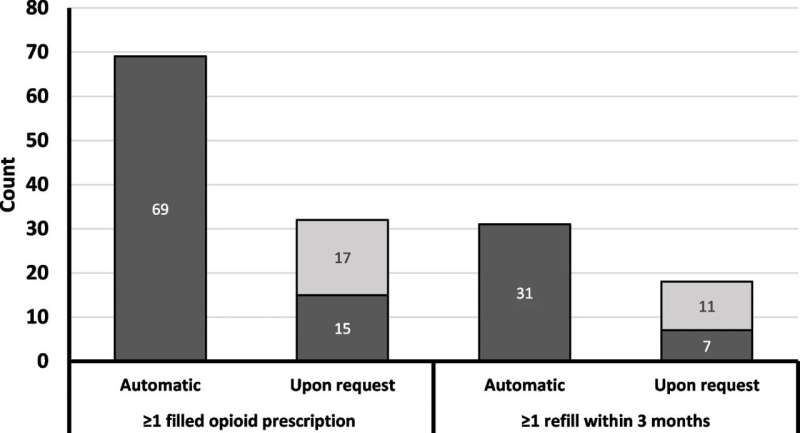This article has been reviewed according to Science X's editorial process and policies. Editors have highlighted the following attributes while ensuring the content's credibility:
fact-checked
trusted source
proofread
Pain protocol eliminates need for opioids following knee replacement in most patients

A study led by Vinod Dasa, MD, Professor of Orthopaedics at LSU Health New Orleans School of Medicine, reports that a novel surgical pain management strategy following total knee arthroplasty (TKA), or total knee replacement, provided pain relief without opioids.
The researchers also found that changing prescriptions for opioids at discharge from automatic to upon request dramatically decreased opioid use. Their results are published in the Journal of Experimental Orthopaedics.
"About 70% of opioid-naïve patients needed only Tylenol and anti-inflammatory medications to manage their pain," notes Dr. Dasa. "Opioid use in health care is improving but remains difficult to manage. Surgical pain was long thought to be unavoidable, requiring a large amount of pain medications. Creating innovative strategies to enhance surgical recovery by reducing pain and eliminating opioids can help solve some of our biggest challenges."
The 144 patients in the retrospective study received the same multimodal analgesia protocol except for postoperative opioid prescribing. The novel multimodal analgesia regimen included percutaneous cryo-neurolysis, a long-acting nerve block, about five days before surgery. Immediately before surgery, patients received a single dose of 150 mg pregabalin, 200 mg celecoxib, and 1000 mg intravenous (IV) acetaminophen.
Upon discharge, all patients were advised to take 325 mg of acetaminophen every four hours for two weeks and 75 mg of diclofenac every 12 hours for 6 weeks.
The authors conclude, "More than half of all TKA patients and 72% of opioid-naïve patients who were treated with a multimodal pain protocol designed to minimize opioid use for up to 3 months, and received opioids only upon request after surgery, recovered from TKA without the use of any opioids and any worsening of self-reported pain or knee-related problems compared with patients who received an opioid prescription automatically upon discharge."
More information: Leland van Deventer et al, A modern multimodal pain protocol eliminates the need for opioids for most patients following total knee arthroplasty: results from a retrospective comparative cohort study, Journal of Experimental Orthopaedics (2023). DOI: 10.1186/s40634-023-00585-0




















